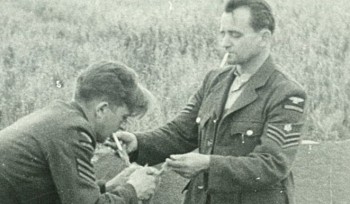
On 7 April Hitler and Mussolini met at Salzburg; Mussolini had been discouraged by recent Axis defeats and wanted Italy to lobby for a separate peace, but Hitler persuaded him to stay in the alliance. Ominously, on the same day American and British forces in Tunisia linked up near the town of Gafsa, and advancing up the Tunisian coat the British Eighth Army took the important port of Sfax on 10 April.
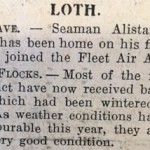 It was the practice of many hill farmers to winter their flocks further south where the pasture was better. The John O’Groat Journal report for Loth this week reports that, “Most of the farms in the district have now received back their hoggs [young ewes that have not yet been sheared] which had been wintered in the south. As weather conditions have been very favourable this year, they are looking in very good condition.”
It was the practice of many hill farmers to winter their flocks further south where the pasture was better. The John O’Groat Journal report for Loth this week reports that, “Most of the farms in the district have now received back their hoggs [young ewes that have not yet been sheared] which had been wintered in the south. As weather conditions have been very favourable this year, they are looking in very good condition.”
On 5 April the Wick Harbour Trust noted that they had received a letter from 18 Group R.A.F. 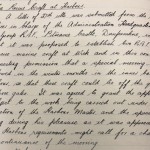 in Dunfermline, requesting permission “to establish two R.A.F. Air/Sea Rescue marine craft at Wick and … requesting permission that a special mooring might be allowed in the winter months in the inner basin of the Harbour, so that the craft could be off the quay during onshore gales.” The trust agreed to grant the application.
in Dunfermline, requesting permission “to establish two R.A.F. Air/Sea Rescue marine craft at Wick and … requesting permission that a special mooring might be allowed in the winter months in the inner basin of the Harbour, so that the craft could be off the quay during onshore gales.” The trust agreed to grant the application.
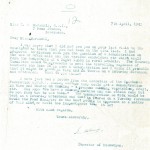 On 7 April the Director of Education wrote to the schools inspectorate HMI “to discuss with you the question of a demonstration on the use of dried milk and the various sandwiches etc which would form the components of a light lunch in rural schools.” The SWRI has also written to him, he added, “asking whether they could get a demonstration … of canning – I presume canning vegetables, fruit, etc. She says, “We have a canning machine and can obtain cans but do not know how to use them.”
On 7 April the Director of Education wrote to the schools inspectorate HMI “to discuss with you the question of a demonstration on the use of dried milk and the various sandwiches etc which would form the components of a light lunch in rural schools.” The SWRI has also written to him, he added, “asking whether they could get a demonstration … of canning – I presume canning vegetables, fruit, etc. She says, “We have a canning machine and can obtain cans but do not know how to use them.”
During last year’s “Warship Week” campaign, the people of Caithness had raised £233,000 and had “bought” a destroyer for the Royal Navy, named HMS Campbell after the late Major-General John C. Campbell of Thurso. Now the John O’Groat Journal reported that ceremonies had been held in Wick and Thurso at which crests of the destroyer were presented to the burgh and county councils, and a plaque given to the ship in return. Accepting the plaque and giving thanks, Captain Pizey said, “The officers and men of the Campbell … would now feel that they had a very special bit of the United Kingdom where the people were watching their interests and their fortunes. 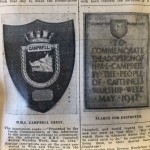 That would mean a great deal to them, and he was certain that the Campbell would not let them down.”
That would mean a great deal to them, and he was certain that the Campbell would not let them down.”
